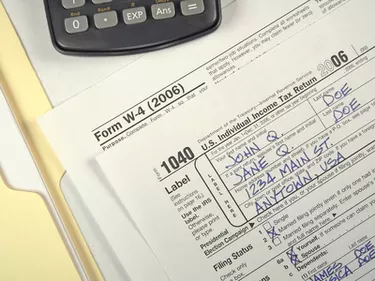
Some buyers and sellers of retail goods think the general sales tax is not unlike an income tax in three major ways: it's not particularly fair and it's phenomenally complicated, not to mention the fact it takes a significant amount of money out of taxpayer pockets. In short, many believe there's little to like about a general sales tax.
Little wonder that, in efforts to run on a platform that appeals to voters, many politicians tout a commitment to tax reform. But regardless of the possible need to reform some aspects of state and local tax codes, one thing's for sure: general sales taxes fund the much-needed services that cities, combined areas and states provide.
Video of the Day
Video of the Day
The General Sales Tax
Unlike the income tax, a general sales tax is a consumption tax that is paid at the local and state levels when a consumer or an entity without a tax-exempt status purchases certain goods and services. For instance, sales tax is collected for the sale of physical property, such as furniture, appliances and automobiles.
Like other taxes, the general sales tax revenue stream supports the provision of government services by cities, counties and other taxing units. In this way, citizens of a certain city, combined area or state, and citizens who purchase sales tax-eligible items from businesses who operate in those locales, bear the financial burden of those services.
Businesses who sell the products and services that are sales tax-eligible collect tax from customers, report it and pay it on a regular basis.
State General Sales Tax
Sales tax is levied by a state government and applied to goods and services at their point of purchase. Typically, the seller of the good or service on which the sales tax is levied collects the tax and remits it to the state's taxing authority.
According to Ballotpedia, the general sales or use tax is the primary source of a state's revenue. For instance, Texas levies a 6.26 percent state sales and use tax on all retail sales, leases and rentals of most goods, as well as taxable services.
State Sales Tax Rates
The Tax Foundation reports the following for the year 2021:
- You'll pay state sales taxes in 45 states and the District of Columbia.
- You'll encounter local sales taxes in 38 states.
- Tennessee (9.55 percent), Louisiana (9.52 percent) and Arkansas (9.51 percent) come out on top for the highest average rates for state and local sales taxes combined.
Use of Resale Certificates
States charge a sales tax on any and all purchases, whether made by individuals or entities, unless the purchaser has a state tax-exempt status. When a tangible item is sold by a distributor or wholesaler to another reseller, that reseller must pay a sales tax unless she produces a valid resale certificate.
Examples of Tax-Exempt Items
Some items are tax-exempt, meaning the item's purchaser is not required to pay a sales tax when the item is purchased. For instance, prescription and nonprescription medicines, groceries and gasoline have tax-exempt status in the state of Texas. Consequently, a business is not required to collect sales tax on the sale of those items.
Regressive Tax System
One test of any tax system is whether it's a regressive or progressive one. The tax system is progressive if those with higher incomes pay a higher proportion of their income in taxes. The theory behind progressive taxation is that the wealthy presumably have more disposable income and can thus afford higher taxes.
Unlike the progressive tax system, the regressive nature of the current sales tax system means that general sales tax rates increase as a product's price rises. Consequently, a regressive tax requires the poor to pay the same or a greater portion of their income in taxes relative to that paid by the wealthy.